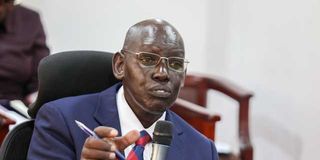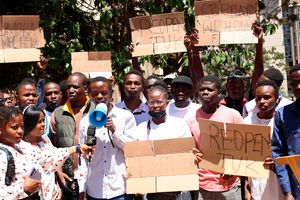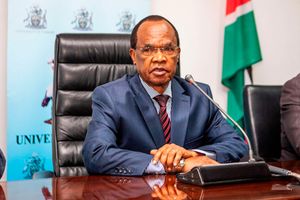
Principal Secretary for the State Department of Basic Education, Dr Belio Kipsang, when he appeared before the National Assembly last year.
The education sector is facing a major financial crisis as government funding allocations fall short by Sh27 billion across primary, junior secondary, and secondary schools.
This funding gap could strain essential resources, affecting teacher salaries, learning materials, and in-frastructure, ultimately impacting the quality of education.
While appearing before the Education Committee, Principal Secretary for Basic Education Belio Kipsang revealed that the education budget has glaring funding gaps that could disrupt learning nationwide.
For Free Day Secondary Schools, the government allocated Sh54.886 billion, yet the required amount stands at Sh76.654 billion, leaving a deficit of Sh21.768 billion.
“Free Day Secondary Education has a deficit of Sh21.85 billion, with targeted capitation funds for 3,244,325 secondary school students at Sh22,244 per learner and 9,243 SNE learners at Sh50,772 per learner. This implies that 982,197 students will not be provided for under FSDSE,” he said.
This shortfall raises concerns over the ability of schools to meet operational costs, including teacher salaries, infrastructure, and learning materials.
Many secondary schools have already been struggling with inadequate infrastructure, with classrooms, libraries, and laboratories lacking essential resources. If the financial gap is not addressed, schools could be forced to cut down on critical expenses, such as hiring additional teachers or maintaining school facilities.
Junior Secondary Schools are also experiencing a funding shortfall, receiving Sh45.669 billion against the required Sh46.1 billion, leaving a deficit of Sh4 billion.
“Targeted capitation funds are allocated to 3,287,450 junior secondary school students at Sh15,042 per learner and 7,686 SNE learners at Sh50,772 per learner,” he said.
The introduction of the Competency-Based Curriculum (CBC) has placed additional pressure on junior secondary schools, which require specialized facilities, digital learning tools, and teacher training pro-grams to ensure effective implementation.
The underfunding of this level of education could slow down CBC implementation and affect learning outcomes for millions of students.
In primary education, Belio revealed that it has been allocated Sh9.121 billion, falling Sh1 billion short of the Sh9.781 billion required. This could impact programs like feeding schemes, free learning materials, and teacher support.
“Targeted capitation is allocated to 6,569,201 primary school learners at Sh1,420 per learner, including top capitation for 117,565 SNE learners at Sh2,300 per learner. Boarding fees for 39,056 SNE learners are set at Sh11,650 per learner. As a result, 656,512 learners will not receive capitation,” said Belio.
Many public primary schools rely on capitation funds to run essential programs. With this funding gap, some schools may struggle to provide free learning materials, affecting the quality of education in lower grades.
Further, Kipsang revealed that the budget allocation of Sh12 billion under school administration for 2024 includes funding for KILEA and KPSEA national assessments.
“In addition, the program was granted funds to cater for pending bills. The full allocation includes KSh 1.3 billion for the School Feeding Programme,” he said.
The Kenya National Examinations Council (Knec) requires Sh3.57 billion for the administration of key national exams such as KCSE and KPSEA, yet the funding gap poses a risk to their effective execution.
Exam administration involves printing, security, invigilation, and grading, all of which require signifi-cant financial resources. Any delay or disruption in the examination process could have severe conse-quences for students, particularly those preparing for their final year assessments.
The Low-Cost Boarding School Programme, which currently enrolls 411,000 learners, is also facing budget constraints.
“While funds have been allocated to cover breakfast, dinner, and cook salaries, the current budget only provides Sh5 per learner per day for 180 days. Additional funds would be needed to increase this allocation to a more sustainable Sh 11 per learner per day,” he said.
School feeding programmes have been proven to increase student attendance, especially in disadvan-taged areas. A well-nourished child is more likely to concentrate in class and achieve better academic outcomes.
However, with the current budget constraints, many learners may miss out on daily meals, affecting their ability to learn effectively.
Belio emphasized the urgent need for additional resources to prevent disruptions in learning, school operations, and national examinations. Education stakeholders, including school heads, teachers’ un-ions, and parents, have called on the government to prioritize education funding and ensure that schools receive adequate financial support.
“If these funding gaps are not addressed soon, we risk compromising the quality of education and the future of millions of learners. The government must step in to bridge these shortfalls before the situa-tion worsens,” said a concerned education expert.
The Ministry of Education has urged Parliament to consider increasing budgetary allocations to match the growing demands in the education sector.






